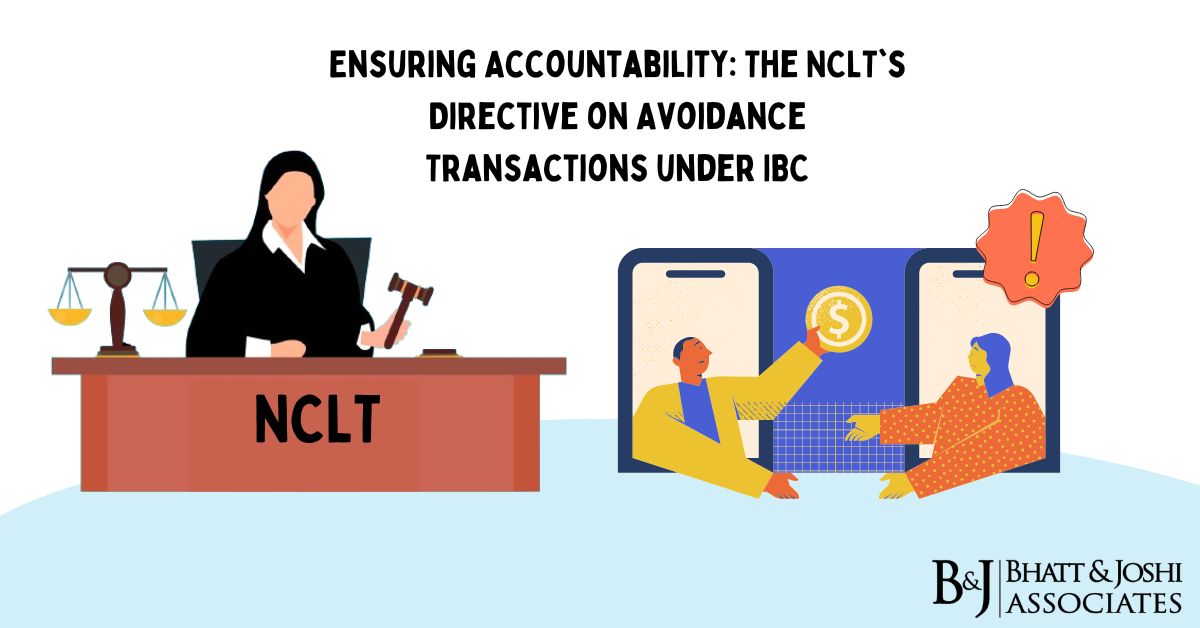
Introduction
The NCLT Ahmedabad Bench’s judgment in *Mr. Shalabh Kumar Daga RP of Silver Proteins Pvt. Ltd. Vs. Mr. Himanshu J Domadia and Ors.* dated 11 March 2024, illuminates the critical aspects of handling avoidance Transactions under IBC. By delving into Sections 43, 45, and 49 of the IBC alongside Regulation 35A of the CIRP Regulations 2016, this judgment underscores the necessity for a resolution professional (RP) or liquidator to diligently identify and address transactions that potentially harm the creditor’s collective interests.
The Core of the Judgment
Examination of Avoidance Transactions under IBC
The application brought forth by the liquidator aimed to scrutinize certain transactions by Silver Proteins Pvt. Ltd. for being potentially preferential, undervalued, or fraudulent under Sections 43, 45, and 49 of the IBC.
“It is only resolved in the meeting of SCC that the application is to be filed. Nowhere the applicant has mentioned that he has formed an opinion whether the corporate debtor has been subjected to transaction covered under Section 43, 45, and 49 of the IBC that too before 115th day from the commencement of CIRP.”
Regulation 35A of the IBBI (Insolvency Resolution Process for Corporate Persons) Regulations 2016
Regulation 35A typically mandates the resolution professional (RP) to form an opinion on the occurrence of certain transactions that might be detrimental to the interests of the creditors. This includes identifying preferential transactions, undervalued transactions, extortionate credit transactions, and fraudulent transactions, as per the relevant sections of the Insolvency and Bankruptcy Code (IBC), 2016. The regulation aims to ensure that the RP scrutinizes the financial activities of the corporate debtor to protect the assets for the benefit of all stakeholders.
Given this context, the regulation emphasizes the necessity for the RP to actively investigate the affairs of the debtor to ascertain if any transactions occurred that could potentially harm the creditors or give undue benefit to certain parties. This duty underscores the role of the RP not just as an administrator of the insolvency process but also as a guardian of the creditors’ rights, tasked with ensuring the equitable treatment of all parties involved.
The Mandate of Regulation 35A
The judgment reiterates the imperative laid out in Regulation 35A of the IBBI (Insolvency Resolution Process for Corporate Persons) Regulations 2016, emphasizing the resolution professional’s responsibility to form an opinion on avoidance transactions.
“(1) On or before the seventy-fifth day of the insolvency commencement date, the resolution professional shall form an opinion whether the corporate debtor has been subjected to transaction covered under sections 43, 45, 50, or 66…”
Implications and Analysis
The Necessity for Due Diligence
The judgment underscores the RP’s or liquidator’s crucial role in conducting due diligence to form an opinion on whether the corporate debtor engaged in transactions that could adversely affect the creditors. This proactive assessment is vital for preserving the debtor’s estate’s integrity and ensuring equitable distribution among creditors.
The Importance of Forming an Opinion
A striking aspect of this judgment is the emphasis on the necessity for the RP or liquidator to explicitly form and document their opinion on the nature of transactions as preferential, undervalued, or fraudulent. This step is fundamental before proceeding with applications to challenge such transactions.
Challenges in Establishing Avoidance Transactions under IBC
The judgment also sheds light on the complexities involved in proving the existence of avoidance transactions. The burden of proof rests on the applicant to not only identify such transactions but also establish the intention behind them and their impact on the corporate debtor’s estate.
Insolvency Resolution Strengthened: Focus on Avoidance Transactions
The *Mr. Shalabh Kumar Daga RP of Silver Proteins Pvt. Ltd. Vs. Mr. Himanshu J Domadia and Ors.* judgment serves as a pivotal reference point for resolution professionals and liquidators navigating the intricate landscape of avoidance transactions within the IBC framework. It reinforces the procedural rigor mandated by Regulation 35A of the CIRP Regulations 2016, ensuring that the examination of preferential, undervalued, and fraudulent transactions is conducted with due diligence and factual substantiation.
This judgment not only aims to protect the creditors’ collective interests but also fortifies the principles of fairness and transparency in the insolvency resolution process. By elucidating the procedural and evidentiary standards required to address avoidance transactions, the NCLT Ahmedabad Bench contributes to the evolving jurisprudence under the IBC, fostering a more robust and accountable insolvency resolution mechanism in India.













